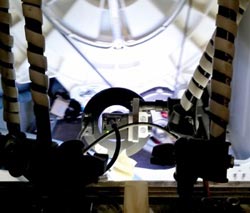GRACE Improves Production and Product Quality

<br>
The goal of the recently completed EU-supported project GRACE was to improve product quality by changing existing manufacturing processes only – i.e. without utilizing higher quality and thus more expensive materials, or new processes.
The CT experts succeeded here by analyzing how all individual aspects of factory automation influence the quality of the finished product. Using so-called multi-agent systems, the specialists came up with new approaches for product development, and their methods are now ready for practical application.
Continual measurements of product quality as early as during the manufacturing process provide important information on how to reduce rejects and lower throughput times. Such quality testing usually isn't possible in traditional factory automation systems because the combination of individual process steps cannot be studied as a whole. The new model is able to identify factors (and their causes) that have a major influence on product quality.
The six GRACE (inteGration of pRocess and quAlity Control using multi-AgEnt technology) project partners examined the production process for a washing machine. Using their model, the Siemens researchers were able to determine how the manufacturing process for a shaft that drives the spinner centrifuge influences the quality of that component. They found out that optimizing one step in the multistage production process could substantially increase the shaft's reliability and service life. Even minor changes suggested by the model can lead to significant improvements.
For example, the researchers modeled just five of the more than 100 individual parts of another washing machine component, and two out of more than 200 product functions – and just the associated optimizations proposed by the model reduced the share of component rejects from seven percent to less than two percent.
A practical industrial test revealed further optimization potential for an existing production line. Here, the model concluded that two quality control stations were no longer needed. Instead, two new control stations were installed to monitor quality on another part of the line. As a result of this measure, the time needed for functional tests of the washing machines was reduced by 30 percent.
Media Contact
More Information:
http://www.siemens.com/innovationnewsAll latest news from the category: Machine Engineering
Machine engineering is one of Germany’s key industries. The importance of this segment has led to the creation of new university degree programs in fields such as production and logistics, process engineering, vehicle/automotive engineering, production engineering and aerospace engineering among others.
innovations-report offers informative reports and articles covering technologies such as automation, motion, power train, energy, conveyor, plastics, lightweight construction, logistics/warehousing, measurement systems, machine tools and control engineering.
Newest articles

Combatting disruptive ‘noise’ in quantum communication
In a significant milestone for quantum communication technology, an experiment has demonstrated how networks can be leveraged to combat disruptive ‘noise’ in quantum communications. The international effort led by researchers…

Stretchable quantum dot display
Intrinsically stretchable quantum dot-based light-emitting diodes achieved record-breaking performance. A team of South Korean scientists led by Professor KIM Dae-Hyeong of the Center for Nanoparticle Research within the Institute for…

Internet can achieve quantum speed with light saved as sound
Researchers at the University of Copenhagen’s Niels Bohr Institute have developed a new way to create quantum memory: A small drum can store data sent with light in its sonic…





















